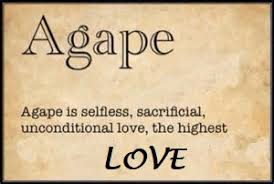Thought for the Week – Sunday 14th February 2021
LOVE, such a small but actually quite complex word don’t you think? Not sure? Perhaps try this then, LOVE is ………… What did you decide should be a fitting definition?
Looking it up in the thesaurus made me realise just how many different meanings that word could actually have depending on the context in which it was used and as with all communication, there will also be a degree of individual interpretation by the person hearing it.
So, there is a degree of both care and caution to be considered when throwing that word love into a sentence to describe how we are feeling about something or someone. After all, how do you begin to measure its depth of sentiment in relation to such things as “I love chocolate brownies” or “I love my family” or “I love my partner” or “I love my God”? In what ascending order of sincerity or significance would you try to place them? That little word love has such a huge meaning to us humans that we have written poetry on it, painted it, sculptured it, written songs on it and of course dedicated a day in the year to it, Valentine’s Day. It should of course be St Valentine’s Day but in the interests of secular commercialism, who actually cares about the saint bit and why should it matter?
Take a good marketing name and then smother it with hearts and starry-eyed romantic adulations, before wrapping it up in societal pressure to participate or risk being labelled a misery or find yourself sleeping on the sofa, or both. Apologies to the romantics out there but I cannot help but feel, that for today at least, the special little word ‘love’ has been misappropriated and reduced to a superficial and fickle gesture of sincerity between two people, because of a dutiful compliance to a singular calendar date. What a misery he is I hear you cry! The truth is (apart from being old maybe) it’s because I have come to truly value the concept of love in my life and importantly in the world around me, it is in fact such a very important little word to me, that it also makes me feel a little indifferent about Valentine’s Day tokenism, such is the restorative powers that this little word can yield when given with the right heart, especially in such difficult and potentially lonely times that we currently find ourselves experiencing.
I think the Greeks had the right idea, allocate a different word for all the different types of love! In fact, they had lots of them to cover all manner of love in relationships, such as romance, family, friends, oneself and universal. Interestingly it meant that if they (the Greeks) were feeling romantic, then they would have referred to this type of love as Eros, whereas the type of love that St Valentine actually died for, was known as Agape, a selfless and universal love for God, two very different and contrasting concepts for the use of Valentine’s name.
St Valentine was a 3rd Century Roman priest who defied the emperor by marrying people before God, at the risk of death for doing so. This was not a romantic notion but done out of a dutiful, selfless love for God and for the people who were entering into the sacred sacrament of marriage. When found out, the Emperor had him beaten to death with clubs and then beheaded, for which he was martyred. So, remember if anyone asks you to be their Valentine you might want to think twice before saying yes! I think it’s important to put the St back into St Valentine’s Day, if only to do his sacrifice a far greater service, especially when used in the name of love.
Understanding the different types of love is important to our understanding of Scripture, in particular because it is a foundational element of being Christian. When you hear that word love used so many times in our everyday language and used in so many ways, the risk is that when applied to our understanding of Scripture, its meaning can become distorted or its intention eclipsed and therefore dilutes the nature of the message. The love that we use in Christian theology is the Agape love found within the text of the Gospels and in the various letters of Paul, Peter and John. It is not about the emotional sentiments of the human heart but a reference to the higher love of God through Christ and is a central element of both our Christian belief and theology. It refers to the love of Jesus Christ for humanity, the love of Christians for Christ and of course the love of Christians for others, this is Agape love.
When it comes to love, Jesus raised the bar astronomically. He teaches us to love our enemies, turn the other cheek, and walk the extra mile. To our human minds, that sounds completely outrageous–but that’s the point. If we want to love like Jesus then we have to open our hearts and our minds to a completely selfless and universal love for all, one that can be challenging, painful, often thankless and seemingly impossible at times. Now when your read the commandment “love your neighbour as you love yourself” it should mean so much more than just being nice or helpful to someone, but instead compare it with the level of sacrifice and effort that you would make for yourself, make it totally unconditional, so completely selfless and Christ like, then ask yourself can you really love your neighbour like that? That is Agape….
Danny.
Prayer
Lord you have taught us that all our actions done without love are worthless,
Send your Holy Spirit to pour into our hearts, the most excellent gift of love, which is the true bringer of peace and all other Christ like virtues.
Help us to know and live the love of Christ
Bringing light into the darkness comfort to the lonely peace to the lost. Amen





